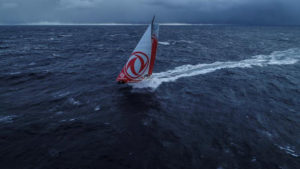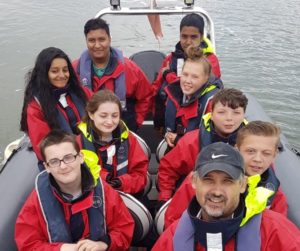Guest Editorial: John Heyes, Chairman, British Finn Association

The final months of 2018 will be recorded in the history of the International Finn class as when World Sailing chose to replace the class for the Paris 2024 Olympic Games with a new and un-tried Mixed Offshore Keelboat event. In truth the Finn wasn’t so much voted out as lost in the process to secure gender equality within the 10-medal format. However a trawl through the WS committee minutes reveals that the real reason for the switch was more to do with money – specifically growing the revenues of the ailing World Sailing coffers.
The minutes of the Equipment Committee meeting reveal that one of the prime movers behind the vote was Matt Allen, President of Australian Sailing and a renowned offshore owner (not a member of the Equipment Committee but was somehow allowed to speak as a substitute for Chairman of the Oceanic and Offshore Committee, Stan Honey from USA). Allen’s pitch was that ‘the event had the potential to meet the demands from the IOC, hopefully enabling World Sailing to move from group D to groups C or B. The importance of the number of viewers for the IOC was acknowledged and the event was presented as a unique opportunity to meet these demands’.
For London 2012, Athletics in Group A was awarded $47 million, Group B Sports $22 million and sailing in group D just $14 million – so it is all about the money!
Much of what Matt Allen says is laudable – to grow sailing and its media penetration – but much of his views are based on the strong media coverage achieved by the last Volvo Ocean Race. Assuming that the same level of resources and media rights sales can be achieved with Olympic sailing is a rash and unfounded jump too far. Each Volvo boat had a dedicated professional onboard reporter, state-of-the-art equipment, remote-control cameras, microphones and custom-designed media stations as well as Sky TV as a media partner. The pressure was on to provide compelling daily content, with lucrative prizes for best media coverage and demanding sponsors to keep happy with brand awareness to justify their big investments.
The result was some great footage and regular social media updates but also some disturbing trends. During quiet stages of the race, crews were reduced to trying to create storylines – one witty duo became the ‘Ant & Dec’ of the Volvo race with their downstairs banter but when the crew of Sun Hung Kai/Scallywag tried to emulate such repartee it backfired badly. Pushed into allegedly sexist quips about applying rash cream to a crew member to enliven the daily broadcast in the doldrums, the crew’s efforts escalated into a Rule 75 protest brought by a distant online follower in Australia – resulting in one of the crew having to leave the boat. Sailors train as athletes – not entertainers or media specialists. The scary fact was that the Scallywag team management were more proud of the fact that they won the overall Inmarsat Team Communications award than they were of their overall result – last. Is Olympic sailing to become the sport of ‘it’s not the winning that counts but the media coverage’?
Proponents will point to the improved tracking software and large numbers playing the virtual Volvo Race as evidence of the huge potential of online coverage of offshore sailing. World Sailing held their first e-Sailing World Championships at the November conference, but how many armchair sailors does it actually convert to real sailing? With sport funding increasingly concentrated on mass participation events that get more people moving and reducing the obesity crisis, e-sailing is unlikely to grow an NGA’s or WS’s funding.
Much has already been written about the last minute submission by World Sailing to replace the previously agreed Mixed One Person Dinghy event and how the subsequent tight voting was incorrectly recorded by the electronic voting system. The WS President and his followers seemed hell bent on rail-roading this through and ignoring any cries of dissent – the minutes simply state ‘Post meeting note: Peter Hall, Pablo Masseroni and Georgy Wossala proposed that the draft minutes be amended on the grounds their votes had been incorrectly recorded. Having considered the proposed amendment and a review of the voting records, the Chairman has approved the minutes without amendment’.
It was also sad to see the UK and Ireland delegates at the conference voting to remove the Finn from the Olympic slate. You might think that a country that won the last 5 Finn gold medals would wish to hang onto the expertise they have developed in the class, but apparently not. Exactly why UK Rep Dick Batt voted (or was instructed) to reject the Finn is not clear, although it does give the RYA the political high ground that the British Sailing Team is now representing a wider spectrum of its 110,000 paying members.
So what of the new, untried Mixed Offshore Keelboat event? All we know is that it will include a 48 hr Offshore race for, perhaps, only 12 nations off the coast of Marseille in 2024.
Presumably the mixed crew will be filmed from every angle and be expected to send exciting and attention grabbing interviews every few hours whilst trying to win a gold medal? How will Olympic broadcasters be able to sustain the excitement and coverage for 48hrs with potentially no other boats in sight or in little wind? How will the security of the athletes be maintained over such a racecourse and how will officials stop any out of sight cheating? Is this really going to grow the sport and appeal of sailing?
Of the twelve elite nations able to afford a campaign, who will they select to represent them as their best medal bet? A young pair of aspiring athletes from a keelboat academy, a U23 Finn sailor teamed with a top female dinghy sailor with transferable skills or an older, proven professional offshore sailor with huge technical and weather routing experience such as the likes of Phil Sharp, Sam Davies, Alex Thomson, Dee Caffari, or a Michel Dejoyeaux – who would be able to afford the necessary multi boat campaign? Will ‘Swifter, Higher, Stronger’ be replaced by ‘Older, Richer, Communicator’?
Close boat-on-boat action of top athletes racing Finns in big waves and winds does makes a great spectacle, as evidenced by the great footage from the offshore courses at the Rio Olympics, but was surprisingly never shown during the Games. By developing onboard and drone footage, aided by on-screen tracking, bringing Finn racing to life for spectators is now much more attainable and cost effective. It is much easier to maintain an audience’s excitement and attention span over 40 minutes than it is over a 48 hour race – half of which is in the dark!
As Paul Henderson suggested recently, by all means trial the Mixed Offshore class as a demonstration event at Paris 2024, but don’t throw the baby out with the bathwater in case it fails to deliver and leads to sailing losing its Olympic status.
In the UK, sadly several Olympic hopefuls have already quit the class, Ben Cornish has sold his boat, Silver Cup bronze medalist Hector Simpson and Cameron Tweedle have also put their campaigns on hold. The British Finn Association is working with the remaining GAC Pindar U23 squad to build some keelboat experience into their training to help keep them in the class whilst also helping them make a break into professional sailing. Supporters of the Finn worldwide are still working hard to overturn World Sailing’s decision and until the IOC ratifies World Sailing’s proposals in 2020 (or even early 2021) to change the Olympic slate, then nothing is set in stone.
Written by John Heyes, Chairman, British Finn Association.











